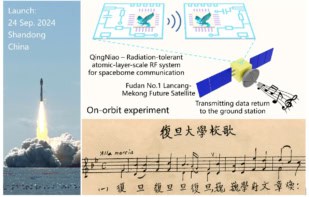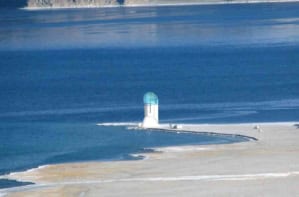Libby Jackson, human exploration programme manager at the UK Space Agency, talks to Tushna Commissariat about taking chances, making bold choices, and finding her way into the space sector

When she was eight years old, physicist-turned-engineer Libby Jackson penned and illustrated a “travel guide to Mars”. Part of a school assignment set over the summer holidays, she was meant to research a place that she someday hoped to visit. Jackson decided upon a rather more liberal interpretation of the assignment, as she dreamed of a terraformed Martian surface, teeming with “an amazing selection of hotels you could stay at [and] also plenty of marzipan and Mars bars to go around”. Space has been a life-long passion for Jackson and today she is the human exploration programme manager for the UK Space Agency.
“My interest has always been in space, but when I was younger, I didn’t know that the UK had a space industry or that you could possibly be an engineer or a scientist working in that field,” says Jackson. Indeed, it was only when she spent a week of her summer holidays at Space School UK at the age of 16, that she learnt about the many different roles, beyond that of an astronaut, that the space sector affords. Jackson went on a visit to what was then Matra Marconi Space company in Bristol, which later became Astrium, and subsequently Airbus. “I clearly remember my fascination that day, seeing real space hardware and satellites that were being built here in the UK. That was when I had the first inkling that perhaps one day this might be something I could do. But at the time, my focus really was on my impending GCSEs and then A-levels and on to university. So while the seeds were sown, I still couldn’t really see how I’d get there just yet.”
UK space sector set for take-off
In fact, this is something that Jackson is keen to tell students today, who may have a “big crazy dream” but might not know how to fulfil it. “When you are at university, and you look at people you admire or who are doing jobs that you want – know that none of these people would have known how they would get there either, when they were 15. You may be able to look back and see the path, but for now it’s just a series of stepping stones. Just look for the lily pad or the next stone that seems interesting to you, and if you’re enjoying it, then that’s the right way.”
When you are at university, and you look at people you admire or who are doing jobs that you want – know that none of these people would have known how they would get there either, when they were 15
For Jackson, the next life-changing step came a year later aged 17, when she had to organize a week of work shadowing. On a whim, Jackson and a friend used the latter’s e-mail account (few people had e-mail access at the time) to contact NASA, and by some stroke of luck, she and the friend were invited to spend two weeks at the Johnson Space Center in Houston, US. “We saw the neutral buoyancy lab where they trained astronauts. We even got into the building where they house all the Apollo lunar rocks, and to this day, I’ve not seen those since.” But what Jackson remembers most from that trip is the time she spent at mission control. “I sat next to Kathy Larson, who was working on a propulsion systems console – she was shuttle flight controller, and they were running simulations for shuttle launches and aborts. And I just put the headset on, and I thought, ‘This is it…this is where I want to be.’ ”
After getting her A-levels in physics, maths, further maths and music, Jackson did a BSc in physics at Imperial College, London. She then enrolled for a Master’s in aeronautics and space engineering at Cranfield University in 2002. Between the two degrees, Jackson did a summer placement at EADS Astrium (now Airbus), working with a team on synthetic-aperture radar imaging – indeed, her thesis research was also done with the group. At the end of her degree, the same group offered her a job. “While the work was interesting for a summer, it just didn’t excite me enough, so I turned them down, with nothing else on the horizon,” says Jackson.
As it happened, this was the right decision – Jackson put together a CV, which stated that she was looking to work specifically in mission control and operations, and sent it to a variety of graduate schemes and several of the space companies in the UK. “In the end, it was Astrium that invited me for an interview. It turned out that they were looking for graduates to work in a team to develop a satellite operations centre, and this became my first job.”
I want young people to know that the space sector can be a welcoming place, no matter your gender, race or sexual orientation
Jackson spent the next three and a half years at Astrium as an operations engineer. Despite being one of only two female engineers in her team at the time, she always felt welcome. “I’ve been lucky. I certainly hear horror stories about academia and engineering, but I think the space sector is a bit different. That’s a very important message I’d like to get out. I’m not for a minute pretending that sexism isn’t an issue in the sector, but I want young people to know that this can be a welcoming place, no matter your gender, race or sexual orientation.”
Variety of life
Around 2007, once Europe became part of the International Space Station (ISS) and the Columbus science lab module was to be launched, Jackson moved to Munich and became an instructor at the Columbus Control Centre, and spent the first year and a half training flight controllers. A few years later, the opportunity arose for her to become a flight director, and she jumped at the chance.
So what’s a day in the life of a flight director like? “Well, every day is different, as you’re making decisions and problem-solving, while working with an amazing team of very talented people. There were daily science experiments to be run, and there might be some maintenance to do. Always, we had to keep the crew safe, keep the vehicle safe, and then get on with the mission. The mantra for mission control is crew, vehicle, mission. And you do all of this while working at the forefront of human exploration.”
Today, Jackson works at the UK Space Agency, leading the country in human space exploration. “I work with our astronauts, and on the science that goes on at the ISS. I work with academia and industry to make sure everyone can make the most of the UK’s space endeavours.”
Money from the Moon
At the end of this year, the European Space Agency (ESA) – which the UK will still be a member of post-Brexit – will host a meeting of all its member states, to agree on future programmes and funding. “The decisions that will be made at the end of this year should see ESA commit to part of the lunar gateway and the return of humans to the Moon, and part of the mission to return samples from Mars. The UK is hoping to be a part of these, and my job is to be writing the business cases that will be put to the UK Treasury, to make the case for the UK’s investment in these missions.”
Jackson is emphatic that the space sector is thriving. “We need people to join in, and physics is an ideal route into it, as you’ve seen from my story. Whether that’s getting into space to do research, or whether it’s any one of the many other roles, there’s something for everyone.”





